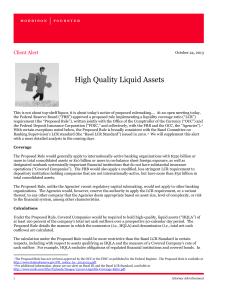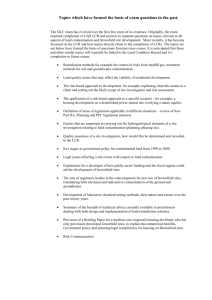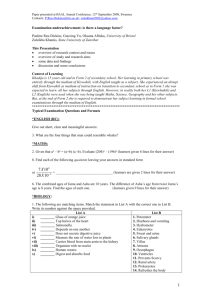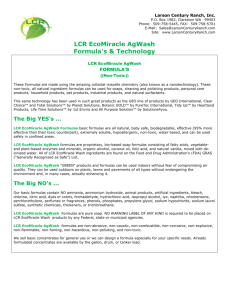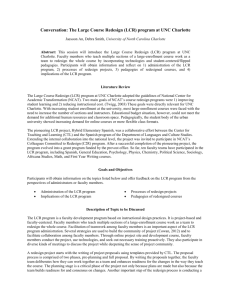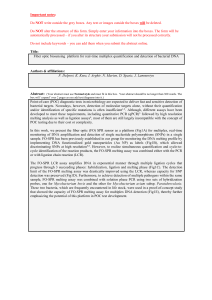Preliminary charts for EBA
advertisement
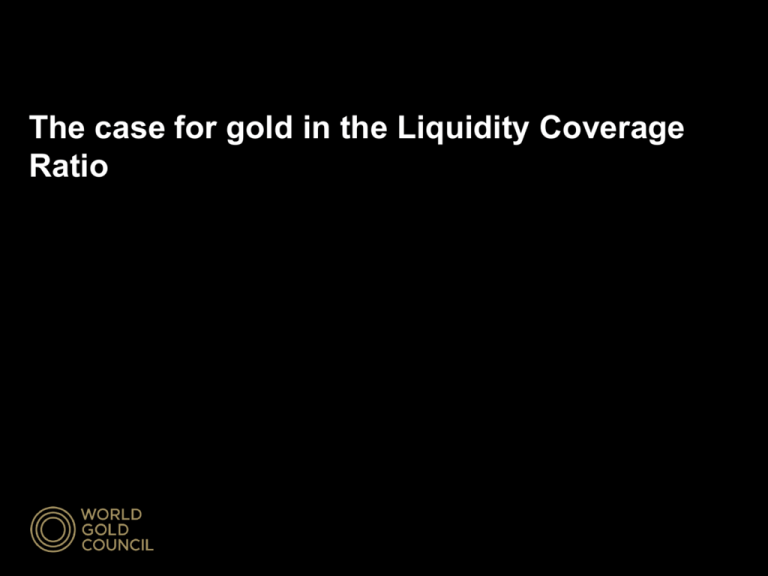
The case for gold in the Liquidity Coverage Ratio Disclaimer This presentation is provided solely for general information and educational purposes. It is not, and should not be construed as, an offer to buy or sell, or as a solicitation of an offer to buy or sell, gold, any gold related products or any other products, securities or investments. It does not, and should not be construed as acting to, sponsor, advocate, endorse or promote gold, any gold related products or any other products, securities or investments. This presentation does not purport to make any recommendations or provide any investment or other advice with respect to the purchase, sale or other disposition of gold, any gold related products or any other products, securities or investments, including without limitation, any advice to the effect that any gold related transaction is appropriate for any investment objective or financial situation of a prospective investor. A decision to invest in gold, any gold related products or any other products, securities or investments should not be made in reliance on any of the statements in this presentation. Before making any investment decision, prospective investors should seek advice from their financial advisers, take into account their individual financial needs and circumstances and carefully consider the risks associated with such investment decision. While the accuracy of any information communicated herewith has been checked, neither the World Gold Council nor any of its affiliates can guarantee such accuracy. In no event will the World Gold Council or any of its affiliates be liable for any decision made or action taken in reliance on the information in this presentation or for any consequential, special, punitive, incidental, indirect or similar damages arising from, related to or connected with this presentation even if notified of the possibility of such damages. Expressions of opinion are those of the author and are subject to change without notice. World Gold Council | The Case for Gold in the LCR | 2 Context Regulators around the world are in the process of writing new proposals to introduce or amend rules on the amount of high quality liquid assets that commercial banks must hold. This is part of the Basel III regulations. This presentation looks at the case for gold as a high-quality liquid asset. World Gold Council | The Case for Gold in the LCR | 3 The case for gold as a high quality liquid asset World Gold Council | The Case for Gold in the LCR | 4 Gold has no credit risk Gold is not issued. It has no credit risk. If a commercial bank buys gold it would be held on an “allocated basis” (meaning the bank owns specific bars identified by a serial number) by a custodian. As the gold is “allocated” it is not on the custodian’s balance sheet. If the custodian were to go bankrupt the gold could easily be identified by the serial numbers – unlike cash balances. World Gold Council | The Case for Gold in the LCR | 5 Sovereign risk is non zero risk Sovereign default/restructuring events 1. UK (1932) 2. US (1933) 1920 3. Germany (1948) 4. Japan (1946-1952) 1940 1960 5. Brazil (1990) 6. Russia (1998) 1980 2000 7. Greece (2012) 2010 1. UK (1932) - Most of the outstanding WWI debt was consolidated intoa 3.5 percent perpetual annuity. 2. US (1933) - Abrogation of the gold clause. In effect, the U.S. refused to pay Panama the annuity in gold due to Panamaaccording to a 1903 treaty. 3. Germany (1948) - Monetary reform limiting 40 Deutschemark per person. Partial cancellation and blocking of all accounts. 4. Japan (1946-1952) - After inflation, exchange of all bank notes for new issue(1 to 1) limited to 100 yen per person. Remaining balances were deposited in blocked accounts. 5. Brazil (1990) - Abrogation of inflation-linked indices embedded in the original contracts. Largest default (US$ 62 billion) in1990. 6. Russia (1998) - Largest local currency debt default (US $39 billion) since Brazil 1990. 7. Greece (2012) - Largest sovereign default in history (~$US130 billion of ~$US450 billion written down) Sources: Reinhard, Carmen S. and Rogoff, Kenneth S., The forgotten history of domestic debt , April 2008; Economist World Gold Council | The Case for Gold in the LCR | 6 Gold has committed market makers – the London OTC market LBMA market makers by product Spot Forwards Options The Bank of Nova Scotia X X Barclays Bank Plc X X Credit Suisse X Deutsche Bank AG X X X Goldman Sachs International X X X HSBC Bank USA NA X X X JP Morgan Chase Bank X X X X X Merrill Lynch Bank International Ltd X Mitsui & Co Precious Metals X Societe Generale X X X UBS AG X X X Source: LBMA World Gold Council | The Case for Gold in the LCR | 7 Gold is not correlated with other LCR assets World Gold Council | The Case for Gold in the LCR | 8 This reflects the diversity of supply and demand 2012 demand by source 2012 supply by source Total: 4,453 t Total: 4,453 t Jewellery (1,908 t) 43% Mine supply** (2,828 t) 63% Investment* (1,582 t) 36% Recycled gold (1,626 t) 37% Technology (428 t) 10% Official sector (535 t) 12% *Includes bars, coins, ETFs, OTC purchases and gold stock movements t: tonnes Source: Thomson Reuters GFMS, World Gold Council World Gold Council | The Case for Gold in the LCR | **Net of producer hedging t: tonnes Source: Thomson Reuters GFMS, World Gold Council 9 The gold market is deep 20.8m Total above ground stocks = 174,100 tonnes (US$9.6 trillion)1 20.8m 1 Based on end-2012 volume and Q4 2012 average gold price of US$1,721.8/oz. 2 Includes “other fabrication” (12%) and “unaccounted for” (2%). Note: Totals may not sum due to independent rounding. Source: Thomson Reuters GFMS, US Geological Survey, World Gold Council World Gold Council | The Case for Gold in the LCR | 10 Gold versus outstanding bond issuance World Gold Council | The Case for Gold in the LCR | 11 $240 billion daily volume—topping most other assets World Gold Council | The Case for Gold in the LCR | 12 Gold performs well during liquidity stress periods As a general framework to uncover liquidity stress periods we examined instances when the Euro FX basis swaps widened significantly. There were 7 discreet periods that the basis swaps pointed toward as potentially funding pressures in Europe. These instances were cross checked against 10 instances when Euribor-Eonia also widened by a rate greater then 2.5 standard deviations in a given week. Three periods were excluded where Euriobor-Eonia widened and the FX basis did not. Those were a rate hike by the ECB and 2 sub-prime related events that were more US specific. 1. Lehman bankruptcy (12/9/2008 – 3/10/2008): One of the largest US financial institution collapses sending markets into turmoil 2. European rating downgrades (13/2/2009 – 27/2/2009): In the midst of an ECB easing cycle the ratings of Spain and Greece are cut in late January. G7 and European leaders meet in Early February to discuss to examine stability and convergence programmes 3. Greek fiscal problems discovered (30/10/2009 – 27/11/2009): On 5 November New Greek Prime Minister, George Papandreou, announces that Greece’s annual budget deficit will be 12.7% of GDP — more that twice the previously announced figure. 4. European debt crisis (30/04/2010 – 07/05/2010): The European sovereign debt crisis takes center stage as European leaders agree to EFSF and EUR110bn Greek rescue package 5. Irish bailout: Irish debts sell off as anxiety about an Irish sovereign debt interest payment holiday grips bondholders. On 16 November Irish bailout talks begin. Private Sector Involvement in restructurings becomes prominent issue. 6. Greek bailout restructured (16/09/2011 – 04/11/2011): On 19 September Italy downgraded along with 24 Italian banks. European sovereign spreads peak. IMF Fifth review of Greece released. Papandreou calls for euro referendum 7. Greek elections (18/05/2012 – 22/06/2012): Greece fails to form a coalition government. In early June, Spain announces will make formal request for aid to shore up banks. World Gold Council | The Case for Gold in the LCR | 13 Gold was the best performing asset in most stress periods Event Beg Date End Date Gold Bunds OATs Italian UK Gilts US Treasury Euro Agency Euro Supra Lehman bankruptcy 9/12/2008 10/3/2008 13.47% 2.19% 2.01% 1.78% 4.03% 3.87% 1.27% European rating downgrades Greece fiscal problems discovered 2/13/2009 2/27/2009 3.08% -0.19% -0.43% -0.12% -0.87% 1.14% 10/30/2009 11/27/2009 10.48% 0.80% 0.74% 0.40% -0.81% Covered Cash 1.72% 0.41% 0.23% 0.01% 0.19% -0.21% 0.12% -0.24% 0.53% 0.62% 0.58% 0.08% EFSF launch 4/30/2010 5/7/2010 6.50% 1.38% 0.94% -2.11% 1.69% 6.27% 0.14% 0.58% -0.57% 0.01% Irish bailout 11/5/2010 11/12/2010 2.42% -0.50% -0.61% -1.12% 0.50% 1.45% -0.39% -0.65% -0.63% 0.03% Greece bailout restrucutured 9/16/2011 11/4/2011 -2.49% 0.54% -2.38% -4.17% 4.55% 0.96% -0.24% -0.69% 0.70% 0.27% Greece elections 5/18/2012 6/22/2012 -0.19% -0.67% 1.38% 0.20% 1.15% 1.66% 0.79% 0.46% -0.54% 0.12% 4.75% 0.51% 0.24% -0.73% 1.46% 2.16% 0.30% 0.32% -0.04% 0.12% Average World Gold Council | The Case for Gold in the LCR | 14 Demand for gold increases during crisis periods World Gold Council | The Case for Gold in the LCR | 15 Thank you For questions please email: Reserve_Asset@Gold.org World Gold Council 10 Old Bailey London EC4M 7NG T +44 207 826 4700 F +44 207 826 4799 W www.gold.org World Gold Council | The Case for Gold in the LCR | 16



